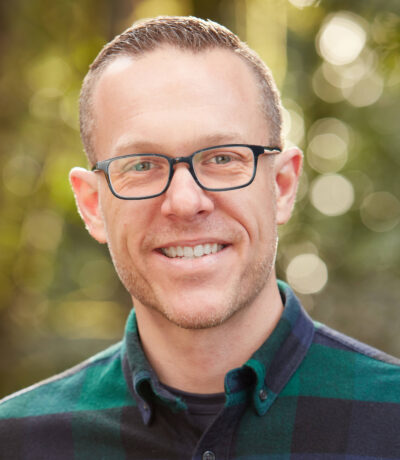Clinical Director, Director of the Anxiety Center, Co-Director of Research and Outcomes Monitoring
Anxiety Center
BIOGRAPHY
Dr. Osborne (he/him/his) works with adults in the Anxiety Center. He is the Clinical Director of EBTCS, Director of the Anxiety Center, and Co-Director of Research and Outcomes Monitoring at EBTCS.
Dr. Osborne is a specialist in the evidence-based treatment of anxiety and related problems in adults and is board certified in Behavioral and Cognitive Psychology by the American Board of Professional Psychology (ABPP). He has extensive training and experience in cognitive-behavioral and exposure-based treatments for anxiety disorders, including obsessive-compulsive disorder (OCD), panic disorder, social anxiety disorder, agoraphobia, generalized anxiety disorder, posttraumatic stress disorder (PTSD), and specific phobias. He also treats hoarding disorder, body dysmorphic disorder (BDD), and body focused repetitive behaviors (hair pulling, skin picking).
Dr. Osborne is particularly passionate about the treatment of OCD and related conditions. He is a Training Institute faculty member for the International OCD Foundation (IOCDF), volunteers his time as a consultant to the OCD and Hoarding Support Group of Seattle, and was the co-founder and co-director of Camp DCO, an annual camp for teenagers and adults with OCD. He has also been featured as a therapist on the television shows “Extreme OCD Camp” on BBC3 (British Broadcast Channel 3) and “Hoarding: Buried Alive” on TLC (The Learning Channel).
In addition to his clinical work, Dr. Osborne is actively involved in training and dissemination of evidence-based treatments for anxiety. He previously served as the Director of Training for the postdoctoral training program at EBTCS (2010-2017). He has also been a Clinical Instructor with the Department of Psychology at the University of Washington since 2007 and provides ongoing clinical supervision for doctoral students in clinical psychology. Aside from clinical supervision, Dr. Osborne regularly gives trainings and presentations to professionals, trainees, and the public about evidence-based treatment approaches for anxiety, OCD, and hoarding.
Dr. Osborne has become increasingly interested in practice-based research, or research that is conducted in “real world” clinical settings. This interest led him to become a co-founder of the Behavioral Health Research Collective (BHRC), a non-profit organization whose mission is to host an Institutional Review Board (IRB) that provides ethical review and oversight of research projects conducted by mental health professionals in practice settings. He has served as Chair of this IRB since 2011.
Dr. Osborne received his Ph.D. in clinical psychology from the University of Missouri – St. Louis. His initial interest in working with people with anxiety disorders developed while working as a therapist and research assistant at the university’s Center for Trauma Recovery, a specialty center dedicated to research and treatment of PTSD and other trauma-related problems. He completed his clinical psychology internship at the VA Puget Sound Health Care System, Seattle Division, where his training focused primarily on working with individuals with PTSD, as well as those with chronic medical illnesses. After graduating with his doctorate, Dr. Osborne completed a two-year clinical-research postdoctoral fellowship at the University of Washington School of Medicine, where he worked as a therapist and researcher on several grant-funded clinical trials examining cognitive-behavioral interventions for pain management in persons with a range of medical disabilities (i.e., spinal cord injury, amputation, multiple sclerosis).
Dr. Osborne is a member of the Anxiety and Depression Association of America (ADAA), American Psychological Association (APA), Association for Behavioral and Cognitive Therapies (ABCT), International OCD Foundation (IOCDF), and TLC Foundation for Body-Focused Repetitive Behaviors. He is a licensed psychologist in the state of Washington. Dr. Osborne is also a member of PSYPACT with authority to practice interjurisdictional telepsychology (APIT).
SELECT PUBLICATIONS
Osborne, T. L. (2018). A step-by-step guide for creating an independent institutional review board (IRB) for private practitioners. In R. T. Codd (Ed.), Practice-based research: A guide for clinicians (pp. 81-107). New York: Routledge.
Osborne, T. L. (2018). Research in private practice settings. In R. T. Codd (Ed.), Practice-based research: A guide for clinicians (pp. 130-152). New York: Routledge.
Osborne, T. L., Michonski, J., Sayrs, J., Welch, S. S., & Karworski, L. A. (2017). Factor structure of the Difficulties in Emotion Regulation Scale (DERS) in adult outpatients receiving dialectical behavior therapy (DBT). Journal of Psychopathology and Behavioral Assessment, 39, 355-371.
Moore, S., Welch, S. S., Michonski, J., Poquiz, J., Osborne, T. L., Sayrs, J., & Spanos, A. (2015). Psychometric evaluation of the Overall Anxiety Severity and Impairment Scale (OASIS) in individuals seeking outpatient specialty treatment for anxiety-related disorders. Journal of Affective Disorders, 175, 463-470.


